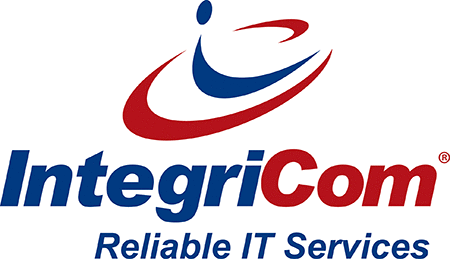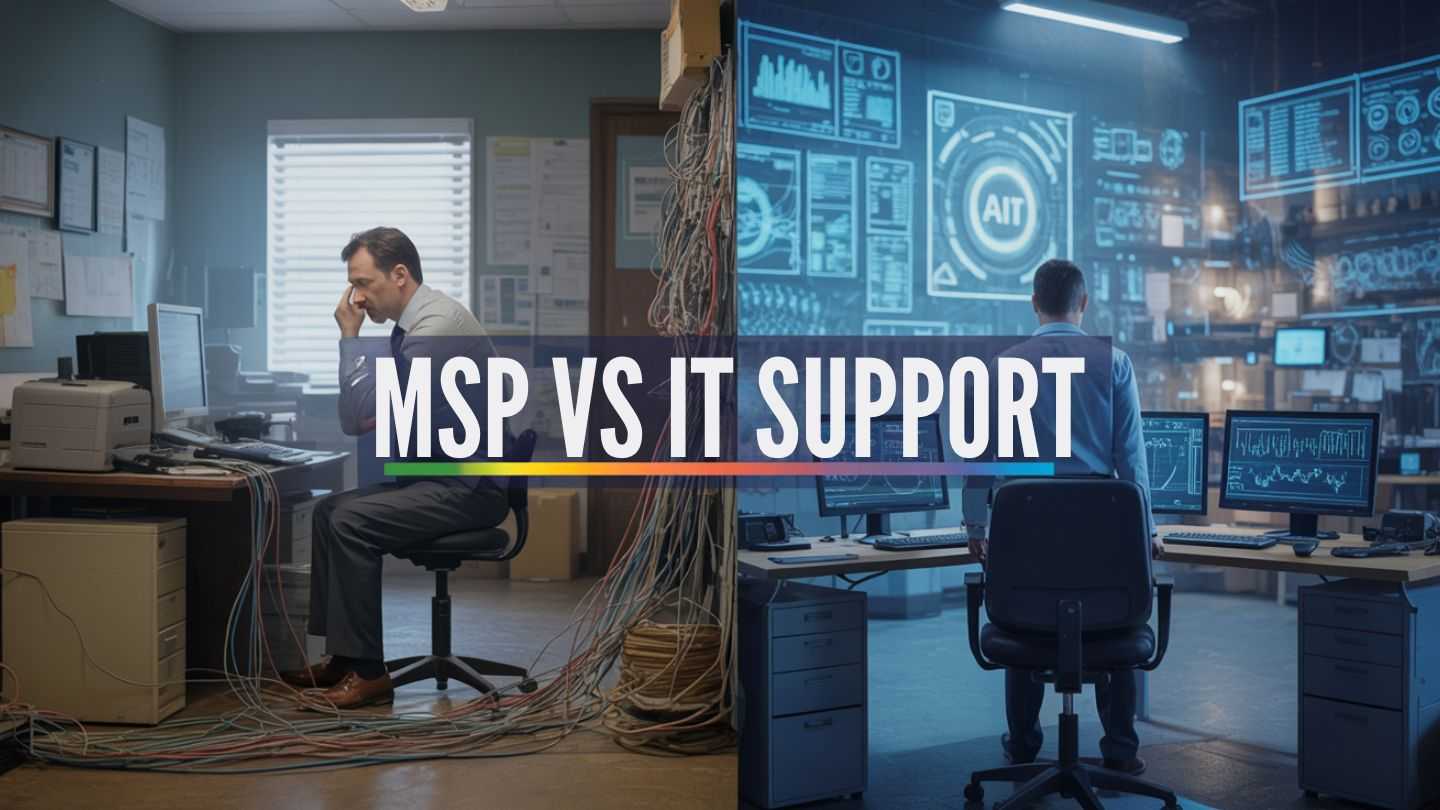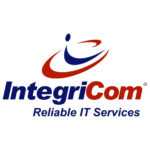Technology plays a critical role in keeping businesses running smoothly, but the way companies manage their IT needs can vary greatly. Some rely on ongoing, proactive partnerships, while others seek help only when problems arise. These different approaches can impact cost, efficiency, and overall business performance. Understanding how each model works is essential to making an informed choice. In this blog, we’ll compare the two to help you determine which best supports your goals.
Key Takeaways
- Managed Service Providers (MSPs) offer proactive IT management, unlike traditional IT support, which is primarily reactive.
- MSPs provide predictable cost structures through fixed subscription fees, whereas traditional IT support incurs variable costs based on service requests.
- The strategic advantages of MSPs include enhanced security measures, scalability, and tailored IT solutions that align with business objectives.
Understanding Traditional IT Support
Traditional IT support is primarily reactive, addressing issues as they arise rather than preventing them. This approach is suitable for businesses with stable and non-complex IT needs. The focus is on providing immediate technical assistance to resolve problems as they occur, ensuring that system failures are diagnosed and fixed to reduce downtime.
However, this reactive model has its limitations. Users may experience wait times for help desk responses, leading to delays in resolving technical issues and impacting overall business efficiency. Unlike managed services, traditional IT support often relies on in-house support teams, which can be constrained by limited resources and expertise.
In essence, traditional IT support services offer a straightforward approach to handling technology infrastructure. While it can be effective for businesses with minimal IT complexities, the lack of proactive measures can result in unpredictable disruptions and inefficiencies in the long run. For example, a small accounting firm relying on traditional IT may find itself facing hours of downtime during tax season simply because an issue wasn’t detected early.
What is a Managed Service Provider (MSP)?
Managed Service Providers (MSPs) offer a comprehensive approach to IT management, encompassing continuous monitoring, proactive support, and strategic planning. Unlike traditional IT support, MSPs adopt a holistic understanding of IT needs, integrating various solutions tailored to business objectives. Businesses exploring the MSP model should understand how to choose a managed service provider that aligns with their operational needs, industry compliance requirements, and long-term growth plans.
The strategic advantage of partnering with an MSP lies in the enhanced efficiency, tailored support, and robust security measures they provide. MSPs ensure IT systems operate continuously, and they play crucial roles in business success and growth.
This proactive and strategic approach to IT management aligns with advancing technology and cost-effectiveness management effectively. Picture a mid-sized medical clinic that uses an MSP to monitor patient record systems 24/7, and any unusual activity is flagged instantly, preventing both operational downtime and potential compliance violations.
Key Differences Between MSPs and Traditional IT Support

MSPs and traditional IT support differ significantly:
- Managed services provide ongoing IT management.
- Traditional IT support reacts to issues as they arise.
- MSPs offer services like continuous monitoring and proactive maintenance.
- Traditional IT support focuses on immediate troubleshooting.
Another significant difference lies in the cost structures. Traditional IT support typically involves annual fee negotiations or pre-payment arrangements based on block hours, leading to unpredictable costs. In contrast, the cost of managed service support and managed services can be significantly lower, with potential savings of up to 40% over a three-year period compared to traditional in-house IT.
MSPs often bring specialized expertise and can offer tailored solutions due to their extensive resources, unlike traditional IT support, which may face limitations in expertise and customization. These distinct advantages make MSPs a compelling choice for businesses seeking comprehensive IT management.
Cost Structures: Predictable vs. Variable Expenses

Managed service providers typically charge a consistent monthly or annual subscription fee, including a fixed monthly fee, simplifying budget considerations and planning. This proactive service model provides a predictable cost structure, aiding better financial planning and minimizing the risk of unexpected expenses.
In contrast, traditional IT services often incur costs based on specific service requests or projects, leading to variable pricing and financial unpredictability. Businesses using traditional IT support may face unplanned service needs and equipment failures, resulting in unpredictable costs.
Adopting managed IT services can help businesses decrease IT costs and improve system uptime. For example, a retail chain using an MSP may prevent costly POS system failures through regular maintenance, avoiding lost sales during peak shopping hours.
Proactive vs. Reactive Approaches
Managed services focus on prevention through continuous monitoring and IT system optimization, including ongoing monitoring and management. This includes:
- Continuous monitoring and maintenance to mitigate potential disruptions before they occur.
- Proactive monitoring to prevent issues from escalating.
- Ensuring optimal performance and uptime.
Traditional IT support, on the other hand, typically handles security patches and upgrades only upon request and relies heavily on a reactive troubleshooting model. This reactive approach can incur additional unexpected costs due to emergency interventions, often resulting in unpredictable expenses.
Ultimately, shifting from a reactive to a proactive strategy in IT management allows businesses to make informed decisions, minimize risks, and enhance overall efficiency.
Availability and Continuous Monitoring
Managed services offer several key benefits:
- 24/7 coverage options, ensuring a constant support presence for businesses.
- Continuous oversight that enables proactive detection of issues, preventing system downtime and operational challenges.
- Service Level Agreements (SLAs) that define performance standards and responsibilities, ensuring high availability and boosting customer satisfaction, while managed services offer various service offerings.
In contrast, traditional IT support has limited availability, often only during standard business hours, which can lead to delays in issue resolution. Proactive incident response in managed services minimizes operational disruptions, ensuring continuous service delivery. Tiered support levels further enhance service quality by allowing efficient incident management.
Scalability and Flexibility in IT Management
Managed IT services allow companies to adjust their resources in response to changing demands, ensuring efficiency. Clients report improved scalability of IT resources, allowing quick adaptation to changing business needs. This scalable IT infrastructure can accommodate increased data, applications, and users without compromising performance.
Flexible IT services allow businesses to add new tools and solutions without disrupting operations. Outsourcing IT management helps businesses scale without excessive investment in hardware or staffing.
MSPs improve operational efficiency and security by integrating cloud computing solutions to enhance operational efficiency and enabling dynamic resource allocation. For example, an MSP could help a growing e-commerce business scale its server capacity seamlessly during seasonal traffic spikes.
Enhanced Security Measures

Managed service providers (MSPs) offer the following security services:
- Advanced security analytics and robust security measures that provide enhanced protection against cyber threats and physical threats.
- Continuous monitoring and updating of network security to reduce vulnerabilities and ensure regulatory compliance.
- Regular review and updating of disaster recovery plans to stay effective against evolving threats, enhancing overall security.
Clients often highlight enhanced data security as a crucial benefit of managed services. MSPs play a critical role in implementing cybersecurity frameworks that protect against both physical and digital threats. This continuous oversight and proactive approach to security helps businesses safeguard sensitive data and prevent data breaches.
Service Level Agreements (SLAs)
Contractual service level agreements (SLAs) govern managed services. These comprehensive SLAs typically guarantee response times, uptime percentages, and resolution procedures, ensuring high service quality. SLAs clarify expectations and establish accountability between service providers and clients, leading to increased customer satisfaction and trust.
Traditional IT support may lack formal SLAs, resulting in potential discrepancies in service quality and response times. SLAs in managed services provide a reliable and structured approach to IT management, ensuring consistent service levels.
Integration with Emerging Technologies

Companies relying on proactive measures are more likely to stay competitive by adopting the latest technologies. MSPs stay current on emerging technologies, offering strategic guidance and implementation support. This includes assessing the current IT infrastructure and selecting suitable providers to ensure smooth integration and compatibility.
MSPs continually manage and optimize integrated cloud environments, boosting operational efficiency and scalability. The expertise in integrating diverse technologies ensures that businesses can navigate rapid technological changes without disruptions or compatibility issues.
MSPs offer tailored solutions for specific needs like cloud migration, cybersecurity enhancements, and software integration, helping medium-sized and smaller businesses leverage modern technologies for sustainable growth.
Tailored Solutions for Business Needs
Customizing IT solutions to meet unique needs can enhance business efficiency and effectiveness. Managed service providers deliver customized IT solutions aligned with business objectives, enhancing operational efficiency. This allows businesses to address their unique operational challenges effectively.
MSPs identify critical business pain points and propose solutions to mitigate them. Custom IT solutions often include advanced technologies that traditional IT support may not provide, ensuring that businesses can achieve their goals with tailored support.
Risk Management and Compliance
MSPs align with compliance frameworks like NIST, HIPAA, and GDPR to safeguard client data and meet legal obligations. Firms using proactive IT support are better equipped for compliance through regular updates and advanced tools for detecting and preventing cyber threats.
Ongoing employee training ensures MSP staff are aware of compliance requirements and data protection best practices. This comprehensive approach to risk management and compliance helps businesses avoid severe financial penalties and reputational damage.
Focus on Core Operations
Outsourcing IT tasks enables companies to concentrate on their primary business activities, enhancing productivity. Managed services allow businesses to minimize distractions associated with IT management. This approach leads to optimal resource allocation, aligning efforts towards business goals, growth, and innovation.
Delegating IT responsibilities to specialists allows organizations to redirect internal resources towards strategic initiatives. Companies transitioning to managed services often gain peace of mind, allowing them to focus on core activities.
Disaster Recovery and Business Continuity

Managed service providers implement robust backup and recovery solutions to ensure effective disaster recovery for businesses. This includes conducting thorough risk assessments and creating tailored disaster recovery plans to enhance business resilience.
MSPs use advanced technologies to consistently back up crucial data, ensuring fast recovery and reduced downtime during emergencies and preventing data loss.
Staffing and Expertise
Engaging an MSP provides several advantages:
- Access to specialized knowledge not readily available in-house.
- Reduced HR overhead and administrative burden compared to an in-house IT team.
- Streamlined hiring process by managing the entire lifecycle of contingent talent.
- Enhanced operational efficiency.
Using an MSP can improve compliance with labor regulations through its structured processes. This ensures that businesses have access to the necessary expertise without the complexities of managing an internal team.
Client Testimonials and Case Studies
Client testimonials showcase real-life examples reflecting the transformative power of managed services. A key benefit often highlighted through client testimonials includes:
- Cost savings
- Efficiency gains
- Enhanced security
- Peace of mind
Businesses relying on managed services have reported increased operational efficiency and significant reductions in IT-related costs. As more companies recognize these benefits, switching to managed services becomes an attractive option for enhancing IT strategies.
Choosing the Right IT Support Model for Your Business
The decision between ongoing managed services and traditional break-fix IT support comes down to your organization’s priorities. A proactive approach offers continuous monitoring, preventive maintenance, and strategic planning, while reactive support addresses issues as they arise. Understanding these differences ensures your business can choose the model that delivers the best balance of cost efficiency, uptime, and long-term value.
At IntegriCom, we provide the expertise and reliability you need from an IT managed service provider in Atlanta. Our proactive solutions are designed to minimize downtime, strengthen security, and align technology with your business goals. Partner with us to gain a dependable technology strategy that keeps your operations running at peak performance.
Frequently Asked Questions
What is the main difference between a Managed Service Provider (MSP) and traditional IT support?
An MSP offers proactive, ongoing IT management with continuous monitoring and maintenance, while traditional IT support is typically reactive, addressing issues only when they arise.
Why is proactive IT management important for businesses?
Proactive IT management helps prevent problems before they cause downtime, improves security, and ensures systems run efficiently, ultimately reducing the risk of costly disruptions.
Are managed IT services more expensive than traditional IT support?
Not necessarily. While MSPs charge a fixed subscription fee, which can appear higher upfront, this model often saves money in the long run by avoiding unexpected repair costs and downtime.
Can a Managed Service Provider help with compliance requirements?
Yes. MSPs often align services with compliance frameworks such as HIPAA, NIST, and GDPR, helping businesses meet legal obligations and avoid penalties.
Do MSPs only work with large businesses?
No. MSPs work with businesses of all sizes, from small startups to large enterprises, providing scalable solutions tailored to specific operational and budget needs.


